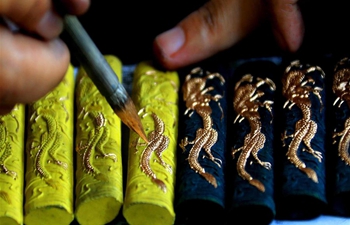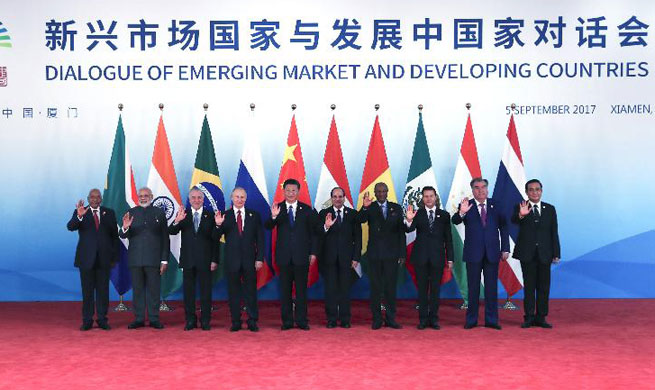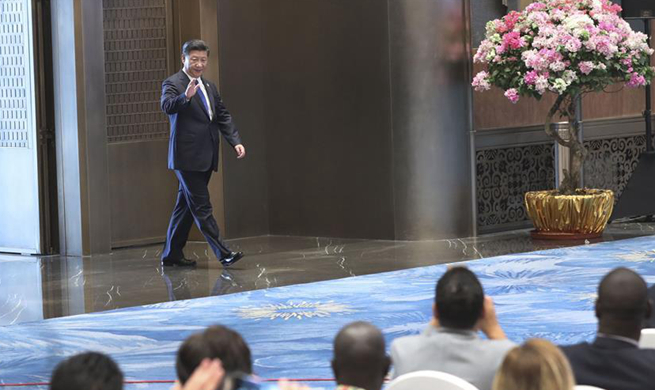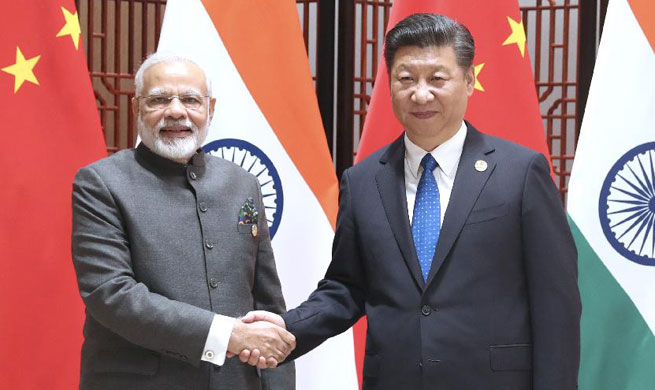by Peter Barker, Gui Tao
LONDON, Sept. 5 (Xinhua) -- The founder of Britain's leading Brexit political party has welcomed Brexit and sees no economic harm if the UK continues the process.
"The economy has done fine since Brexit, we get more foreign investment than any country in Europe, much more than France or Germany," Alan Sked, emeritus professor of international history at London School of Economics (LSE), has told Xinhua in a recent interview.
Statistics released in Spring by the European Commission showed that 2016 was a good year for foreign direct investment into the UK, despite the Brexit referendum vote midway through the year, and despite the ensuing uncertainty about economic prospects and business and trade policy.
But there are also criticisms that Brexit has undermined the investment confidence in the island country by creating huge uncertainties, quoting the ongoing lengthy and complicated Brexit talks as an example.
The UK attracted 1,144 FDI (foreign direct investment) projects in 2016, up 7 percent on the year before, and topping the table of European Union (EU) nations with 19 percent of the total EU FDI. However, this share of the total EU FDI was slightly down on 2015.
"Growth has continued we have full employment, more employed than ever before. I cannot see what has gone wrong with the economy," said Sked.
UK employment has behaved unusually since the financial crisis. Unemployment now stands at 4.4 percent, a low not seen for more than 40 years, and the employment rate is at a record high.
Other nations have seen unemployment rise significantly, for example the equal-sized, developed economy of France where the unemployment rate was 9.5 percent in July.
France is similar to other EU economies, in that it suffered in the eurozone crisis, and for Sked that would be one more reason for the UK to be part of Europe but not in Europe's political and economic institutions.
"The EU has tried to bring in monetary union, which has been its only big policy; that has been counterproductive. The Germans have benefitted and the Dutch but nobody else has," said Sked.
"Greece has been crushed, Spain, Portugal, Ireland, Finland, all these countries have suffered enormous economic damage and because they have been damaged British exports have been damaged.
"Britain needs a healthy eurozone but the eurozone has destroyed the economy in half of europe; they recover a bit now because of negative interest rates and quantitative easing by the European Central Bank."
FUTURE PROSPERITY
The future of the UK economy is also not under a cloud, according to Sked. Some experts had predicted the UK economy would fall into recession after a vote for Brexit, but that has not happened. GDP growth was 0.3 percent quarter on quarter in Q2 this year, below trend and sluggish but not in recession.
For Sked, the EU, while being the UK's largest market, has held Britain back.
"First of all it destroyed our fishing industry through the Common Fisheries Policy. And the Common Agricultural Policy has given us much higher food prices," he said.
"We have had to pay in today it is 20 billion pounds gross 10 billion pounds net we have had to pay in billions over the years which otherwise could have been spent on Britain," said Sked.
The EU had also been responsible for a "huge amount" of bureaucracy and regulation, he said.
As an economic bloc it had not encouraged growth in Europe, with Sked saying that growth in the continent since the Second World War driven by reforms.
"There were supply side reforms in different countries starting with Ludwig Erhard in Germany in 1947, and then Jacques Raff in France in 1962, Thatcher in England in the 1980s, Gerhard Schroeder in Germany in 2003.
"All these supply side reforms to economies have been copied in other parts of Europe and Scandinavia. This is what has caused any growth in Europe."
Sked now favors a complete break with the EU, colloquially called a hard Brexit, whereby the UK leaves all the EU institutions, pays no money towards its activities and negotiates a new trading agreement with the bloc and has the freedom to do so with any nation it chooses to.
"My view is that hard Brexit would be the best Brexit but if we could get a normal free trade agreement, I don't see why we have to pay the EU millions, I don't see a role of the European Court of Justice after we leave. I don't see us paying a big exit fee," said Sked.
Sticking points emerging last week in Brexit negotiations between the EU and UK were centered around the payment the UK would need to make to meet its obligations before it left.
Another issue has been transition, where the UK will continue to follow EU laws and regulations although not being a member of the bloc. Consensus in the British government has moved behind a transition period, to avoid the peril of sudden change coming too quickly and thus damaging trade, businesses as well as other areas of cooperation like air travel.
Sked said: "If there is a transition phase it should not be longer than two years and should be signed in blood that it is a temporary agreement and no longer."
Trade with the EU could be carried on under World Trade Organization (WTO) rules. These are less favorable in terms of tariffs than the UK's current arrangements with the rest of the EU.
"I don't see the fear of WTO rules we do most of our trade with the world on WTO rules. America does the same. We trade with 100 countries under WTO rules," said Sked.
PROUD OF BREXIT
Sked's distrust of the EU came about in the 1980s. It found him joining the Bruges Group, a Eurosceptic think-tank set up after Premier Thatcher's anti-EU speech in Bruges in 1988.
This led to the Anti-Federalist League (AFL) founded by Sked in 1991 as a political party. He stood in several parliamentary elections, including the general election in 1992, when he opposed Chris Patten, later Hong Kong governor, in his seat of Bath.
Sked and his supporters decided to change the name of the party to UKIP in November 1993, "and the goal of the party was to get Britain out of Europe either by pressurizing politically the Conservatives so that they took us out," said Sked.
He was pleased to have opposed the EU and fought for Britain to quit the bloc.
"I am very proud of it," he said.
I played my part certainly. If it hadn't been for AFL UKIP developing the way it did we would not have had Brexit," said Sked.
British Prime Minister David Cameron had been in power 2010-15 with the support of the pro-EU Liberal Democrat party.
Prior to the 2015 election Cameron faced a problem with the rightwing of his party, and he agreed to meet their euroscepticism with a promise for a referendum after the election if he was in power.
"I don't think David Cameron meant to have a referendum. I think when he promised one he thought there would be another coalition government and Nick Clegg (Lib Dem leader) and the Liberal Democrats would veto a proposed referendum," said Sked.
"But he destroyed the Lib Dems in the 2015 election and he had to have a referendum and I still thought he thought he would win it."

















